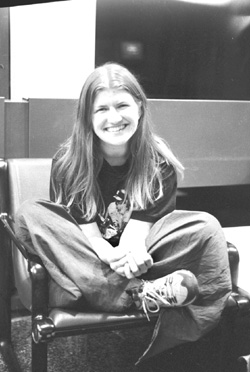

Miller Makes Master Harold
Claire R. Miller is a junior Interdisciplinary Performance Major and
the director of this weekend’s production of Athol Fugard’s “Master
Harold”...and the Boys, a play set in the beginning years of Apartheid
in South Africa. Review co-arts editor Christina Morgan sat down with
Miller this week to discuss the politics and motivation behind the
 (photo by Claire Mershon) |
production, and in addition what Miller
hopes those at Oberlin will gain from viewing “Master Harold”... and
the Boys which will be showing this weekend in Phillips Gymnasium.
Christina Morgan: Why did you want to produce this play?
Claire R. Miller: Well, I wanted to direct something that would make
people think.
This play spoke to me because it was a great opportunity to get people
to think about what I wanted them to think about.
CM: I know you have cast the actors so that no one is playing their
own race. Why did you decide to do this?
CRM: A couple of things. The play fit into stereotyped roles in which
people of color bend over backwards and try to teach and teach and teach
and I figured the audience would see the character and not the story.
I wanted to ask the question: Whose job is it to end oppression? I believe
we’re coming to a climactic point in our history and it is important
to see the world through someone else’s eyes. The actors try as hard
as they can and the audience sees where they succeed and fail and think
as hard as they can.
CM: What do you hope the audience will gain from this reversal of roles?
CRM: I hope that they will gain a new perspective on traditional story
lines, just having to question who they could’ve ended up as seeing
their face in a different role and having to identify with that a little
bit. Basically the role reversals are there to challenge ideas of the
way things are supposed to be.
CM: The play was written by a white South African playwright and is
set in beginning years of the Apartheid era. However, it does not overtly
acknowledge this fact. Do you see this as an asset or fault of the play?
CRM: Originally, I saw it as a big fault of the play. We tried to make
sure we were very educated about Apartheid so the actors could put things
into the words the playwright didn’t. We’re also having a photo exhibit
so people can see people really living in Apartheid conditions.
CM: “Master Harold”...and the Boys concerns a childhood incident in
the life of the playwright. As director, how did you try to make Fugard’s
experiences come through?
CRM: Well I’ve read a lot about the playwright just trying to understand
who he was. I didn’t want the play read as autobiographical to the audience,
just because it’s really powerful when you don’t side with the protagonist.
You can be more critical when you don’t know that Hally (the main character)
grew up to write this play.
CM: Now that apartheid has officially ended, do you think “Master Harold”...and
the Boys is still relevant?
CRM: Yes, it’s still relevant to South Africa, here in the U.S. and
Oberlin. Basically, this play is about a white person who thinks he’s
very enlightened and there are two characters of color who lead entirely
different existences. Right there that reads entirely as this campus
to me.
CM: Even though “Master Harold”...and the Boys specifically focuses
on South African Apartheid do you think the play contains a message
about race relations that applies to the United States right now?
CRM: I come from Cincinnati and basically there’s stuff that’s really
rising. After we see a play we go back to our daily lives, and we are
busy with our daily lives. But, for some of us that involves roaming
the streets inflicting an incredible amount of suffering based on ridiculous
prejudices. But I think all of us who feel we’re too busy to think about
these things, even if somewhat lesser we’re on that level. People are
going to break and not take it. Cincinnati could have spread, and if
they don’t stop and listen and understand this minute there could been
an explosive revolution, and that could be a good thing. But if we don’t
want that then we’d better learn how to understand each other really
fast. Now is the time and this applies to Oberlin, the school and the
town.
CM: If you could sum up the most important message in the play in one
sentence what would it be?
CRM: I feel like the most important thing I get out of this play is
that it’s possible to change the system, but someone has to do it, and
who’s that going to be?
![]()
"Master Harold" Meaningful, But Production Flawed
Multi-Media Pledge of Allegiance Recreated America
Punk, Funk and Rock: Student Music Diverse as Ever